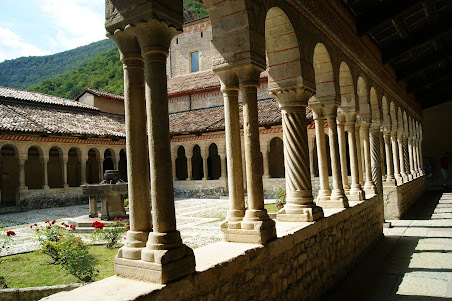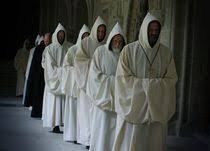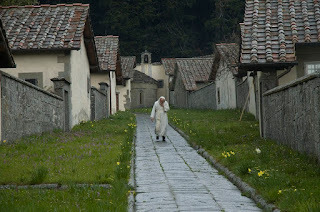If I Ever Found Myself Sinking into Depression
 Cistercian Abbey of Follina (Tv, Italy)
Cistercian Abbey of Follina (Tv, Italy)My take on Marcello Veneziani's heartfelt oration in defense of Vittorio Sgarbi—now ravaged by depression—in the hope that he may rediscover his will to live and passion for all that made him famous. Click here for an Italian version of this post.

 Cistercian monksMarcello Veneziani has gifted us with a heartfelt orationin defense of Vittorio Sgarbi—a moving and intelligent tribute to the great artcritic, now ravaged by depression—in the hope that he may rediscover his willto live and passion for all that made him famous. An exhortation that willlikely linger in the minds of Marcello’s readers, as well as Sgarbi’s admirers,tailored so precisely to its subject that it holds no universal value. BecauseSgarbi is truly one of a kind—an Oscar Wilde-like figure, a Po Valley DorianGray, both carnal and spiritual, a hedonist yet open to the sacred all at once.
Cistercian monksMarcello Veneziani has gifted us with a heartfelt orationin defense of Vittorio Sgarbi—a moving and intelligent tribute to the great artcritic, now ravaged by depression—in the hope that he may rediscover his willto live and passion for all that made him famous. An exhortation that willlikely linger in the minds of Marcello’s readers, as well as Sgarbi’s admirers,tailored so precisely to its subject that it holds no universal value. BecauseSgarbi is truly one of a kind—an Oscar Wilde-like figure, a Po Valley DorianGray, both carnal and spiritual, a hedonist yet open to the sacred all at once.Yet beyond the merits of Veneziani’s article and thetruths so vividly evoked, I found myself reflecting—in a way that mirrors myown inner world. In short, I wondered what I would need to hear from a friend,ideally one as inspired as Veneziani, if it were me falling into depression.After all, I’m around the same age, with my own share of aches and pains. Bythe grace of God, though, I’m not depressed.
 Hermitage of Camaldoli (Ar, Italy)
Hermitage of Camaldoli (Ar, Italy)Well, the answer comes to me easily: I’d want to hear aheartfelt plea for silence. The silence I’ve known and revered since myyouth—ever since I was fortunate enough to cross the threshold of aBenedictine, Cistercian, or Trappist monastery, or a Camaldolese hermitage, andsavor their stillness, broken only by Gregorian chant and the measured,monotonous footsteps of monks pacing the cloisters. And those scents, those stones,those Romanesque columns, the well at the center, the chime of a bell callingthe faithful to the Liturgy of the Hours before dawn or at twilight.
I’ve toldmyself a thousand times that, by some miracle, there’s a silent monasterywithin me, enclosed within the walls of my body and soul. And inside it,there’s profound peace—even if only for a moment, before being overtaken by aloud, overwhelming wave of reality. But only temporarily, because sooner orlater, that inner hermitage inevitably resurfaces and restores the silence. Andin that absence of noise, somehow, everything around me regains meaning,becoming something worth caring about again. A Camaldolese monk once gave me adefinition of that mystery: a silence inhabited by God.
Yes, I believe that if I were to plunge into depression,the only exhortation with any real chance of reaching me would be an invitationto let myself be enveloped by a silence inhabited by God.

COPYRIGHT NOTICE:All original content of this blog [Wind Rose Hotel] is subject to Creative Commons license (by-nc-sa)



